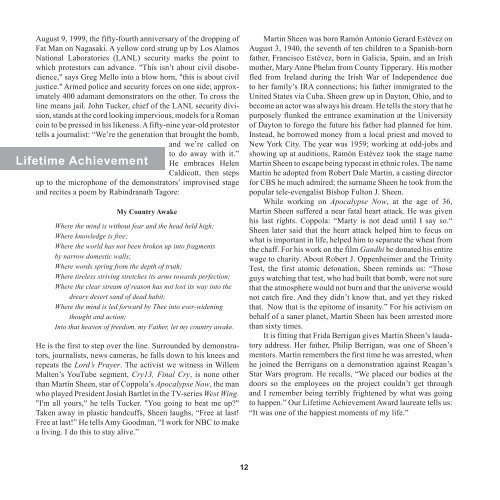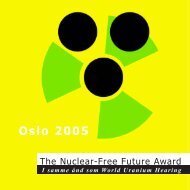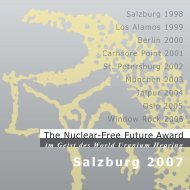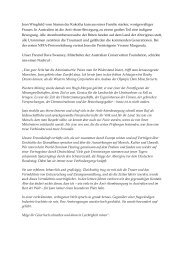New York City - The Nuclear-Free Future Award
New York City - The Nuclear-Free Future Award
New York City - The Nuclear-Free Future Award
Create successful ePaper yourself
Turn your PDF publications into a flip-book with our unique Google optimized e-Paper software.
August 9, 1999, the fifty-fourth anniversary of the dropping of<br />
Fat Man on Nagasaki. A yellow cord strung up by Los Alamos<br />
National Laboratories (LANL) security marks the point to<br />
which protestors can advance. "This isn’t about civil disobedience,"<br />
says Greg Mello into a blow horn, "this is about civil<br />
justice." Armed police and security forces on one side; approximately<br />
400 adamant demonstrators on the other. To cross the<br />
line means jail. John Tucker, chief of the LANL security division,<br />
stands at the cord looking impervious, models for a Roman<br />
coin to be pressed in his likeness. A fifty-nine year-old protestor<br />
tells a journalist: “We’re the generation that brought the bomb,<br />
and we’re called on<br />
to do away with it.”<br />
He embraces Helen<br />
Caldicott, then steps<br />
up to the microphone of the demonstrators’ improvised stage<br />
and recites a poem by Rabindranath Tagore:<br />
Lifetime Achievement<br />
My Country Awake<br />
Where the mind is without fear and the head held high;<br />
Where knowledge is free;<br />
Where the world has not been broken up into fragments<br />
by narrow domestic walls;<br />
Where words spring from the depth of truth;<br />
Where tireless striving stretches its arms towards perfection;<br />
Where the clear stream of reason has not lost its way into the<br />
dreary desert sand of dead habit;<br />
Where the mind is led forward by <strong>The</strong>e into ever-widening<br />
thought and action;<br />
Into that heaven of freedom, my Father, let my country awake.<br />
He is the first to step over the line. Surrounded by demonstrators,<br />
journalists, news cameras, he falls down to his knees and<br />
repeats the Lord’s Prayer. <strong>The</strong> activist we witness in Willem<br />
Malten’s YouTube segment, Cry13, Final Cry, is none other<br />
than Martin Sheen, star of Coppola’s Apocalypse Now, the man<br />
who played President Josiah Bartlet in the TV-series West Wing.<br />
"I'm all yours," he tells Tucker. "You going to beat me up?"<br />
Taken away in plastic handcuffs, Sheen laughs, “<strong>Free</strong> at last!<br />
<strong>Free</strong> at last!” He tells Amy Goodman, “I work for NBC to make<br />
a living. I do this to stay alive.”<br />
12<br />
Martin Sheen was born Ramón Antonio Gerard Estévez on<br />
August 3, 1940, the seventh of ten children to a Spanish-born<br />
father, Francisco Estévez, born in Galicia, Spain, and an Irish<br />
mother, Mary Anne Phelan from County Tipperary. His mother<br />
fled from Ireland during the Irish War of Independence due<br />
to her family’s IRA connections; his father immigrated to the<br />
United States via Cuba. Sheen grew up in Dayton, Ohio, and to<br />
become an actor was always his dream. He tells the story that he<br />
purposely flunked the entrance examination at the University<br />
of Dayton to forego the future his father had planned for him.<br />
Instead, he borrowed money from a local priest and moved to<br />
<strong>New</strong> <strong>York</strong> <strong>City</strong>. <strong>The</strong> year was 1959; working at odd-jobs and<br />
showing up at auditions, Ramón Estévez took the stage name<br />
Martin Sheen to escape being typecast in ethnic roles. <strong>The</strong> name<br />
Martin he adopted from Robert Dale Martin, a casting director<br />
for CBS he much admired; the surname Sheen he took from the<br />
popular tele-evengalist Bishop Fulton J. Sheen.<br />
While working on Apocalypse Now, at the age of 36,<br />
Martin Sheen suffered a near fatal heart attack. He was given<br />
his last rights. Coppola: “Marty is not dead until I say so.“<br />
Sheen later said that the heart attack helped him to focus on<br />
what is important in life, helped him to separate the wheat from<br />
the chaff. For his work on the film Gandhi he donated his entire<br />
wage to charity. About Robert J. Oppenheimer and the Trinity<br />
Test, the first atomic detonation, Sheen reminds us: “Those<br />
guys watching that test, who had built that bomb, were not sure<br />
that the atmosphere would not burn and that the universe would<br />
not catch fire. And they didn’t know that, and yet they risked<br />
that. Now that is the epitome of insanity.” For his activism on<br />
behalf of a saner planet, Martin Sheen has been arrested more<br />
than sixty times.<br />
It is fitting that Frida Berrigan gives Martin Sheen’s laudatory<br />
address. Her father, Philip Berrigan, was one of Sheen’s<br />
mentors. Martin remembers the first time he was arrested, when<br />
he joined the Berrigans on a demonstration against Reagan’s<br />
Star Wars program. He recalls, “We placed our bodies at the<br />
doors so the employees on the project couldn’t get through<br />
and I remember being terribly frightened by what was going<br />
to happen.” Our Lifetime Achievement <strong>Award</strong> laureate tells us:<br />
“It was one of the happiest moments of my life.”





